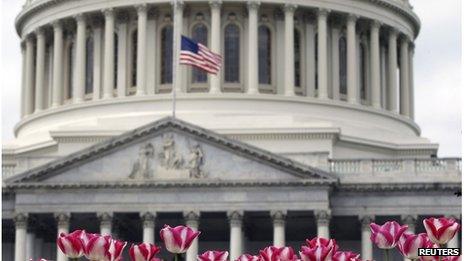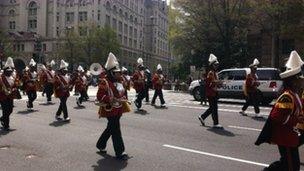Boston bombing: A changed US reaction to terror
- Published

Flags at the US capitol and around Washington were lowered to half mast
Less than 24 hours after the Boston bombings, I was watching a vivid parade through the centre of Washington - indeed between two of the most sensitive security sites in the world, the Capitol and the White House.
In honour of Washington DC Emancipation Day, external, bands blared out their tunes and girls gyrated down the middle of Pennsylvania Avenue. And no-one seemed too worried.
The Washington DC police told us they did beef up security this morning in the light of the attack in Boston. But it wasn't overbearing, indeed it felt pretty low-key.
I asked one mum out with her two young daughters if she felt worried.
"I was a little bit," she said. "But my husband convinced me that was silly and we should just come out and enjoy the day."

Police were present but not overbearing at a Washington DC event on Tuesday
Another woman told me: "You have some concerns but you don't want to live your life in fear."
The mood in America after the Boston bombings generally seems one of sadness and horror but not one of anger or ramped-up patriotism. This is not 9/11.
Or perhaps people's attitude has changed since then. Or perhaps everyone is too much in the dark to react.
President Barack Obama's latest statement shows the frustration that everyone feels.
"We know it was bombs that were set off," he said. "We know that obviously they did some severe damage. We do not know who did them. We do not know whether this was an act of an organisation or an individual or individuals. We don't have a sense of motive yet."
He used the term terrorism, which he had avoided on Monday night.
"This was a heinous and cowardly act." he said. "And given what we now know about what took place, the FBI is investigating it as an act of terrorism. Any time bombs are used to target innocent civilians it is an act of terror."
It may be that when or if it becomes clear who carried out these murders, there will be a big and definite reaction from America.
It may be that more than ten years on from 9/11, the first attack on an American city since then is being treated as a horrible, reprehensible fact of life, rather than something that undermines a nation's sense of self.